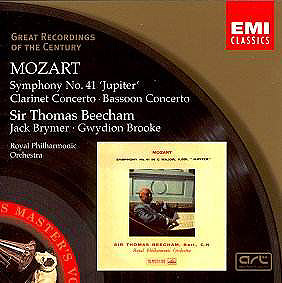More classic Mozart in the Great Recordings of the
Century series of recordings from EMI. Here we have Mozart’s first concerto
(Bassoon) and his last concerto and symphony.
There are many recordings of the Clarinet Concerto
in the catalogue, and many are first rate. Illustrious soloists such
as De Peyer, King, Leister, Meyer and Schmidl, etc. have recorded it,
and in fact Brymer has also recorded the Concerto with Marriner and
Davis in addition to Beecham. What we have here is the then first clarinet
of the Royal Philharmonic playing with the orchestra under the most
famous collaboration of conductor with this orchestra in all its history.
The performance is extremely relaxed, as are both of Brymer’s other
two recordings, but what we have here is what I consider is the best.
Brymer and Beecham, as two equal partners, play this wonderful concerto
from the heart, and EMI’s recording, always pretty good, has come up
as fresh as new paint in this new re-mastering.
When we come to the next piece, Mozart’s Bassoon Concerto,
we have another soloist taken from the desks of the Royal Philharmonic.
Once again, soloist, conductor and orchestra play the work as one. Such
was Mozart’s genius that we can enjoy this early concerto as much as
the much later works, as a result of the care and sheer joy that is
clearly evident in the combined playing. The balance of the soloist
against the orchestra is nigh on perfect, and the location of the recording
(Paris or London) gives a truly outstanding timbre, given Beecham’s
long experience of recording in both locations with his EMI engineering
teams.
The Jupiter Symphony, (first on the disc), displays
Beecham’s conducting of his beloved orchestra in a work which he loved
through and through. Time and time again we hear tiny details in the
phrasing and articulation which often get smoothed over in other (just
as famous) performances.
As is normal with Beecham’s Mozart performances, some
of the tempi can be a little shocking, particularly for those people
weaned on period performances. What we have on this disc is "Big
Band Mozart" with a vengeance – smooth phrasing, slow tempi particularly
in the minuet, substantial string sonorities, solid warm woodwind etc.
etc. This must seem to add up to a particularly bad mixture, given how
current playing techniques have developed. For those collectors who
have not heard Beecham in this repertoire, I urge you to listen carefully
to these performances. This is because they exude a vitality and joy
in the music making which is not only completely satisfying, but also
remains in the memory long after other less well thought out or played
performances.
Before this issue, the most recent incarnation of these
concerti performances were coupled with the Violin Concerto No. 3, played
by Gioconda de Vito. I would rate the current disc vastly superior,
mainly because of the coupling. The re-mastering has clarified the sound
somewhat, but the level of improvement is less than some of the earlier
EMI recordings where there is much more needed to be done.
Go ahead and purchase with confidence – not only do
you get a superb trio of works and performances, you also get deluxe
packaging and a superb set of notes at mid-price.
John Phillips

 Royal Philharmonic Orchestra
– Sir Thomas Beecham.
Royal Philharmonic Orchestra
– Sir Thomas Beecham.